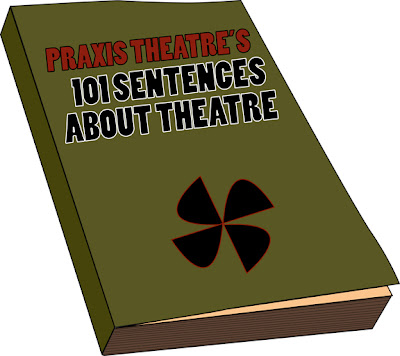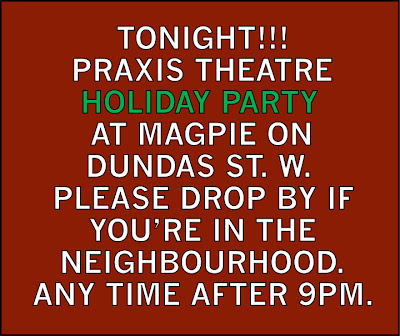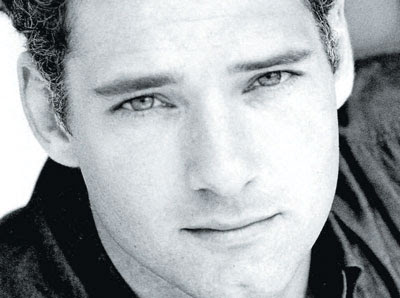 The series continues:
The series continues:
85) The best theater happens unplanned.
86) True theatre experience: I clenched my fists and alternated between wanting to fall asleep and wanting to scream.
87) Theatre is not now, nor has it ever been, in trouble.
88) The tingle in my arm hair when theatre transcends the gap between performer and spectator – to be truly challenged and truly included even for a split second.
89) You have to want to make the other person feel good.
Click here for the series introduction and for a complete list of sentences so far.
While our “10 questions” interview series is on its year-end hiatus, we are pleased to present a short interview series by Praxis Theatre Associate Artist Greta Papageorgiu: The Montreal Interviews. Enjoy!

 1) What does Montreal mean to you?
1) What does Montreal mean to you?
All the greatness of New York and Paris minus the idiots and sharp elbows.
2) Do you feel that SaBooge Theatre is currently living up to the spirit of its mission statement?
That’s a day-to-day query. Today; sure do.
3) You’ve studied clown in Paris at Lecoq as well as with Fusetti in Italy. Are French clowns different from Italian clowns?
The French clowns must be left to simmer for a minimum of 90 minutes while the Italians can be eaten straight off the vine.
4) How does your clown training inform your approach to acting?
It created a capacity for failure and a desire to really, actually play.
5) Having had the opportunity to tour a few of your shows, what is the strangest or funniest thing that has happened to the company or one of your shows along the way?
Having the American authorities confiscate rice-filled juggling balls at the Minnesota border.
6) What would you say to someone who told you “theatre is dead”?
What a shame; my buddies have a show coming up.
7) What would you like to see more of in Canadian theatre?
The undead.
8) Your production of The Dishwashers (Sidemart Theatrical Grocery Production) took place in the basement of a bar. How did the location affect the production?
It made every difference. I had no intentions of doing it elsewhere; the show belongs in the basement of a restaurant. Even if the economics of a 25-seat house boggle the mind.
9) What’s next for SaBooge?
Babies.
10) If you had a $100,000 no-strings-attached production budget, what would you do with it?
Produce the show in Rio. Then make the movie. In Helsinki.

Totally casual. All welcome. Click
here for directions.
While our “10 questions” interview series is on its year-end hiatus, we are pleased to present a short interview series by Praxis Theatre Associate Artist Greta Papageorgiu: The Montreal Interviews. Enjoy!

 1) What does Montreal mean to you?
1) What does Montreal mean to you?
I think Montreal is the soul of Canada, the home and example of the original accommodation between two cultures, that laid the frame work for the Canadian experiment. Today, Montreal, is a living testimony to that experiment – it doesn’t always seem like it’s working but it definitely creates an energy that is vibrant and resonates through the rest of Canada.
For me, personally, it’s the place I call home no matter where I happen to be working.
2)As the recently appointed Artistic Director of Repercussion Theatre in Montreal, where would you like to see the company go under your direction?
I’d like to evolve Repercussion Theater into a centre for classical theatre in Montreal; a place for people who love the classics. From that centre, we will continue to do what we do, producing classical theatre in the park various parks, but also finding ways to reach other communities besides the obvious geographic ones; exploring the a new reality to our modern sense of community.
3) What would you tell a kid who said, “Shakespeare is boring”?
I would agree with him, if his only experience with it was in a classroom environment where he is made to read and study it by himself and then write essays about the themes, plot, etc., for which he will be tested and judged. His plays were written to be. The truest form of a Shakespeare play is created in one’s imagination when it is spoken by people who know how to act it and heard amongst a crowd of people. At the same time we should be grateful that the school system keeps his work alive and that there are many teachers out there who really know how to bring his work to life and peaks the interests of certain student.
4) What are the challenges of putting on a traveling outdoor production?
The cost and maintaining people’s attention. We travel, set up and take down our stages everyday. Transporting a show that can been seen by a potential crowd of 1,200 people outdoors is expensive. Arranging the park space and dealing with different presenters at individual parks also requires a lot of administration.
Artistically, I guess it’s like acting on stage with an animal. The park, the background to your stage, is alive. To work with that environment and still maintain the focus necessary for the work is the key to success. Fortunately, the plays we produce were originally performed with similar distractions and are often set in a forest, field or some Italian piazza
5) What can we do to increase audience sizes in the theatre?
I don’t know. Perhaps by letting people into the process of making a piece of theatre so that they love it as much as the people doing it do. Fundraisers that use lawyers as actors draws a lot of attention. Ad agencies, through the advent of YouTube, are now using consumers to sell themselves products. Attention, the thing which often draws actors to the profession, has become the new commodity. Everyone is fascinated by acting. Perhaps there’s a way to share the experience.
6) What is the strangest thing that has happened to you on stage?
Mask work can be very strange and wonderful. Some of the experiences I’ve had performing in a classroom with a mask have made believe in that I’m not always the one who’s in control.
7) Who is you favourite Shakespearian character?
I wish I could be more clever then this but, off the top of my head, I’d have to say Prince Hal or Henry V. I still feel like a boy who’s misjudged, longs to grow up, get the approval of his father, have adventures and marry a French girl. (My English wife’s last name is Guy – so I’ve got that covered!)
8) Why should a young actor study the Classics?
The way I’ve studied it has given me a process that I can apply to all my work. Through that process I get to ingest the beauty of his work. You know you’ve succeeded if, through the process, you are inspired by his work. If one follows that process in all there work with the belief that that potential beauty lay there – the well will run deep. That being said, I’ve felt the well run dry at times – maybe that’s why my career has led me back to doing the Classics.
9) What plays will you be doing next season?
Will be doing The Tempest and, hopefully remount our production of Les Fourberies de Scapin/Scapin the Schemer. Plus, I’m pushing to produce a two hander that’s is made of some of Shakespeare’s greatest wooing scenes woven together with sonnets and a Christmas show, that revolves around Yorick. Yorick is the deceased court jester whose skull is exhumed by the gravedigger in Hamlet.
10) If you had a $100,000 no-strings-attached production budget, what would you do with it?
Great question – when is one given a $100,000 without strings? I’d do a simple play that I love surrounded by people I love to work with and pay them lots of money. I love Shakespeare. How about 12 actors and one director? Four five-day weeks of five hours rehearsal days (people have children and other commitments), and then perform for three weeks (reasonable) – so I guess that’s about $1,000 a week that’s… pretty good – ooops! I forgot about the designer, a stage manager, space rental, lights, set, union dues, RRSPs, box office administration. Okay, I guess that would bring us to around $600 a week for everyone. Gees, $600 a week . . . Professional Theatre’s a ball of strings.
I’d do it for free and give everyone an amazing vacation – probably in Montreal.
Now offer me a million…
 The series continues:
The series continues:
80) Where are my glasses?
81) Theatre is better than movies because it can respond to the now (if you’re not waiting for a grant).
82) If a company does become larger and acquires more funding, hopefully they don’t fuck things up by using money to take the short cut around a problem.
83) I’m always afraid that someone is going to forget their lines.
84) Standing ovations aren’t always necessary, it’s nice to take a moment to absorb in silence.
Click here for the series introduction and for a complete list of sentences so far.
While our “10 questions” interview series is on its year-end hiatus, we are pleased to present a short interview series by Praxis Theatre Associate Artist Greta Papageorgiu: The Montreal Interviews. Enjoy!

 1) What does Montreal mean to you?
1) What does Montreal mean to you?
It’s the place I grew up. It gave me a cultural identity and a view of the world that lives outside the mainstream. I see life as vulgar and beautiful. Full and empty. Exciting and horribly dull. I see the summer and the winter, the warm and the cold. All this comes from this city that embraces you with open arms and shuts you out when it feels like doing so.
2) As one of the first graduates of the National Theatre School’s directing program, how do you feel about the experience?
The program had been dormant since the mid nineties. As such, this new program was open to us as its co-creators. We had quite a say in how the program was structured and also had to navigate the territory of uncharted pedagogical terrain. It was great, exciting, at times frustrating but always challenging. I am forever thankful for the people I have met.
3) What is Playwrights’ Workshop Montreal?
It is a national new play development organization for the Canadian stage. We are a member-based organization that works with playwrights from across the country to ready new scripts for our stages. We work with emerging playwrights as well as established playwrights with programs like workshop readings, public readings, one-on-one dramaturgy, masterclass, playwright units, residencies (including Tadoussac) and production dramaturgy. We also work with theatres to disseminate the work.
4) As its new Artistic Director, what new initiatives are you hoping to bring to the company?
I’m working towards a creative centre that will allow us to push the boundaries of dramaturgy further into the multidisciplinary. We need to allow our playwrights to work with designers and other artists much earlier in the development process. I’d also like to have a much longer developmental relationship with new theatrical projects.
5) What play have you most enjoyed directing?
I’ve been fortunate enough to direct plays I really love so each has been my favourite. In terms of visual excitement I’d have to say Lifedream by Hérmenigilde Chiasson.
6) What do think is the most important thing Canadian theatre artists should be working on right now?
Metaphor and big ideas: The things the stage does best.
7) In a recent article in the Mirror you commented on the lack of works by female playwrights. Why do think that is and what should we be doing to fix the situation?
We need to be exposed to the work by women so that we grow to demand works by women. We are very conditioned by the male point of view. It is what we crave because it is what we know. We need to open our minds to the way women express their views of the world. These views are just as interesting and as profound as those expressed by men but like any artistic movement we have to be exposed to it to appreciate it. So, get the educational institutions to expand female representation in literary and drama courses. We all love Jane Austen because we all know Jane Austen, we have an appreciation for her work. Let’s raise that awareness for a multitude of other female writers. Women are just as exciting and experimental as men, really! Demand that Theatres produce more work by women and go out to see that work. Support it!
8) What do you think is unique about the Anglophone theatre community in Montreal?
Ummmm. People who live here come because they want to experience Quebecois culture. The city has two big theatrical institutions, National Theatre School and Concordia, so theatre artists come here to study and then leave to go back home or head for the big lights. The theatre community that remains struggles to find space, money and an audience. I don’t want to paint a gloomy picture because there are quite a few vibrant companies but it is a struggle. French theatre, on the other hand, has a great pool of talent, the most inventive artists work in this city, they have the structures to nurture their work if not the money. It is a great city because of the influence movement-based Quebecois theatre has on us as English language theatre artists.
9) As a director what is the strangest thing an actor has done during an audition?
Gosh, I’ve only worked with stable, committed actors.
10) If you had a $100,000 no-strings-attached production budget, what would you do with it?
Put up two plays by Montréal women playwrights.
 The series continues:
The series continues:
75) Applause.
76) Visual ecstasy explored.
77) Own your shortcomings.
78) Theatre is the playwright’s medium; film is the director’s.
79) Canadian theatre is in a deep, but not irreparable state of affairs: It has decreased funding, an aging audience base and a reputation for being boring and elitist.
Click here for the series introduction and for a complete list of sentences so far.
 Please join Praxis Theatre for the second in its series of original play readings. This month, we are pleased to present Matthew Gorman’s If You Could Be Anything (You’d Be Disappointed).
Please join Praxis Theatre for the second in its series of original play readings. This month, we are pleased to present Matthew Gorman’s If You Could Be Anything (You’d Be Disappointed).
WHAT: Reading of Matthew Gorman’s
If You Could Be Anything (You’d Be Disappointed)
WHEN: Monday, December 10 @ 8 pm
WHERE: The Concord Café – 937 Bloor St. West
(Just West of Ossington subway station on the south side)
CAST: Riley Gilchrist, Greta Papageorgiu, Shaun McComb
For more information, please contact Laura Nordin.
 The series continues:
The series continues:
70) Where are our First Nations performance traditions?
71) Theatre can fail.
72) Movies are better than theatre because they pay you more.
73) Boring theatre is bad theatre.
74) Canadian theatre has unprecedented opportunity for growth: It takes place in a society that values the arts, has an educated and relatively wealthy potential subscriber base and a whack-load of talented artists.
Click here for the series introduction and for a complete list of sentences so far.
 The series continues:
The series continues:
65) When the lights go down and I walk out on stage, I feel most alive.
66) Renewal.
67) To turn one’s stomach upside down and then laugh.
68) This shit is addictive.
69) Live bodies moving and making sound to tell a story to other bodies in the same space is a unique experience which has no comparable substitute.
Click here for the series introduction and for a complete list of sentences so far.









Recent Comments